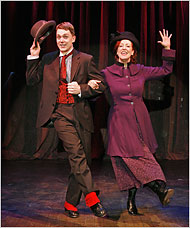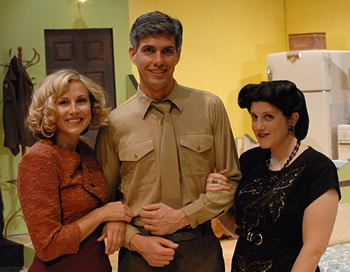Yesterday’s query about whether it’s an Americanism to use the word “counselor” in direct address to a lawyer (i.e., “Well, counselor, do you think you’re going to be able to get me acquitted?”) brought a half-dozen prompt responses, both from English readers of “About Last Night” and from well-informed Americans. All agreed that, as James Hamilton put it, “an Englishman wouldn’t address his solicitor with any title beyond ‘Mr. [name]’.”
Thanks to Mr. Hamilton, Kenny Harris, Timothy Hulsey, David Mackinder, Alex Massie, and fellow blogger Jenny Davidson for setting me straight. And special thanks to Ted Iacobuzio, who suggested “learned friend” as an alternative. That may make it into the revised libretto of The Letter, depending on whether it works in context.
Isn’t the Web cool? Not only am I the first librettist to blog about the creation of an opera, but I’m now the first to request and receive technical assistance from his readers!
Archives for December 5, 2008
TT: Get thee to New Jersey
This was a good theatergoing week for me, and today’s Wall Street Journal drama column reflects my pleasure. I review two shows, the Shakespeare Theatre of New Jersey’s production of The Winter’s Tale and the York Theatre Company’s off-Broadway premiere of My Vaudeville Man!. Both are excellent. Here’s an excerpt.
* * *
Some Shakespeare plays are inescapable, others all but invisible. I usually catch two or three “Macbeths” a season, but more than two years have gone by since I last saw “The Winter’s Tale” on stage. Now the Shakespeare Theatre of New Jersey, a troupe that always delivers the goods, has taken up the cause of “The Winter’s Tale” with a production directed by Brian B. Crowe that ranks high on the list of first-class Shakespeare stagings to come my way in recent years. Intimate in scale, unassumingly intelligent in style and acted by an exceptional cast, it makes easy sense out of a play that, like “Cymbeline,” is widely and wrongly thought to be difficult.
What makes “The Winter’s Tale” so tricky is that its two halves don’t seem to fit together, at least not neatly. The first part is a fast-moving tragedy that ends in black disaster, the second a sunny romance in which some (but not all) of the initial horrors are undone by a climactic stroke of magic. How to smooth over the sudden change of tone? Mr. Crowe and his cast operate on the assumption that there’s no problem to be solved. Leontes (Robert Gomes), the Sicilian king whose inexplicable fit of jealous rage brings about the death of his wife (Linda Powell) and young son (Jesse Easterling), behaves exactly like what he is, a man who is first driven mad by suspicion, then redeemed by remorse. Mr. Gomes’ febrile performance is so believable as to make you feel that he’s earned the second chance at happiness that Shakespeare gives him…
 Written by Jeff Hochhauser and Bob Johnston, “My Vaudeville Man!” is based on “Letters of a Hoofer to His Ma,” the epistolary autobiography of Jack Donahue, a real-life vaudevillian who ran away from home at the age of 17 to pursue a life on the wicked stage, much to the dismay of his mother, a hard-bitten Irish immigrant who took for granted that her son would go the way of his father, a ne’er-do-well drunkard. She was half right. Donahue became a Broadway star but died of alcoholism in 1930, leaving behind the short, sweet memoir from which Messrs. Hochhauser and Johnston have constructed this musical version of his youthful misadventures on the New England vaudeville circuit. The book is a neat piece of theatrical carpentry, the songs agreeable period pastiches that keep the action moving. Nothing very surprising ever happens, nor does it need to: “My Vaudeville Man!” is an uncomplicated crowd-pleaser that gets the job done with plenty of room to spare.
Written by Jeff Hochhauser and Bob Johnston, “My Vaudeville Man!” is based on “Letters of a Hoofer to His Ma,” the epistolary autobiography of Jack Donahue, a real-life vaudevillian who ran away from home at the age of 17 to pursue a life on the wicked stage, much to the dismay of his mother, a hard-bitten Irish immigrant who took for granted that her son would go the way of his father, a ne’er-do-well drunkard. She was half right. Donahue became a Broadway star but died of alcoholism in 1930, leaving behind the short, sweet memoir from which Messrs. Hochhauser and Johnston have constructed this musical version of his youthful misadventures on the New England vaudeville circuit. The book is a neat piece of theatrical carpentry, the songs agreeable period pastiches that keep the action moving. Nothing very surprising ever happens, nor does it need to: “My Vaudeville Man!” is an uncomplicated crowd-pleaser that gets the job done with plenty of room to spare.
Shonn Wiley plays Donahue, Karen Murphy his mother, and both are wondrously fine. Mr. Wiley is, in fact, something of a find, a fresh-faced song-and-dance man who tears into his routines with the utmost gusto….
* * *
Read the whole thing here.
TT: Get small
I go to a lot of out-of-town shows in between Broadway openings, but my reviewing calendar is so crowded that I inevitably miss out on some of the ones that I most wanted to see. Right now, for instance, Long Beach Playhouse is putting on John van Druten’s The Voice of the Turtle, a poignant three-character comedy about love in wartime that has a small but significant place in American theatrical history. It opened in 1943 and ran for 1,557 performances, making it Broadway’s eighth longest-running straight play–yet The Voice of the Turtle has never been revived on the Great White Way since the original production closed in 1948.
 With the financial crunch hitting New York producers where it hurts, I’ve written a “Sightings” column about high-quality small-cast plays that either never made it to Broadway or, like The Voice of the Turtle, haven’t been seen there for decades. Pick up a copy of tomorrow’s Wall Street Journal and you’ll find an annotated list of five such plays, all of which (A) can be produced cheaply and (B) lend themselves to the celebrity casting without which it is no longer possible to open a straight play on Broadway.
With the financial crunch hitting New York producers where it hurts, I’ve written a “Sightings” column about high-quality small-cast plays that either never made it to Broadway or, like The Voice of the Turtle, haven’t been seen there for decades. Pick up a copy of tomorrow’s Wall Street Journal and you’ll find an annotated list of five such plays, all of which (A) can be produced cheaply and (B) lend themselves to the celebrity casting without which it is no longer possible to open a straight play on Broadway.
* * *
Here’s a list of the ten longest-running straight plays in Broadway history:
• Howard Lindsay and Russel Crouse, Life With Father, opened 1939, 3,224 performances
• Jack Kirkland, Tobacco Road, opened 1933, 3,182 performances
• Anne Nichols, Abie’s Irish Rose, opened 1922, 2,327 performances
• Ira Levin, Deathtrap, opened 1978, 1,793 performances
• Albert Innaurato, Gemini, opened 1977, 1,788 performances
• Garson Kanin, Born Yesterday, opened 1946, 1,642 performances
• Jean Kerr, Mary, Mary, opened 1961, 1,572 performances
• John van Druten, The Voice of the Turtle, opened 1943, 1,557 performances
• Neil Simon, Barefoot in the Park, opened 1963, 1,530 performances
• Neil Simon, Brighton Beach Memoirs, opened 1983, 1,530 performances.
For what it’s worth, none of these plays has ever been successfully revived on Broadway. I wonder why? Maybe that’s another column….
* * *
UPDATE: Read the whole thing here.
The other plays on my list, in case you’re wondering, are Alan Ayckbourn’s Relatively Speaking, David Ives’ Ancient History, Kenneth Lonergan’s This Is Our Youth, and George Bernard Shaw’s Don Juan in Hell.
TT: Almanac
“How terrifying and glorious the role of man if, indeed, without guidance and without consolation he must create from his own vitals the meaning for his existence and write the rules whereby he lives.”
Thornton Wilder, The Ides of March
